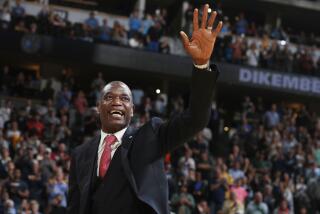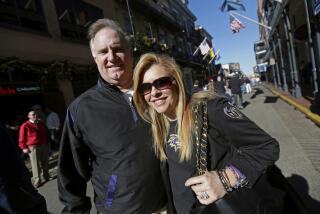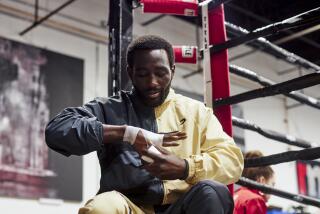Pain and Insight
- Share via
NEW BRITAIN, Conn. — God never meant for him to get in that taxi. It was a mistake. A celestial fluke.
On that night in June, Manute Bol had called a cab to take him home from a basketball game, and, right away, they got lost.
“Don’t worry,” the driver said. “I’ll get you there.”
How could Bol know the man had a suspended license? That he was drunk?
Sailing down a Connecticut road too fast, the taxi clipped a guardrail, veered across two lanes and slammed into a rock ledge. The driver died. Paramedics found Bol unconscious on the pavement.
His neck was fractured in three places, his kneecap broken. His left wrist was so pulverized that surgeons temporarily grafted it to his body to keep the blood circulating.
In dark days and weeks that followed, lying in a bed the hospital pieced together with extra pieces of steel and wood so his 7-foot-7 body would not hang off the end, Bol kept asking why.
“Maybe God wanted to kill that guy,” he thought. “I just got in the way.”
This was a player known throughout basketball as an eccentric, a clown prince always joking. This was a guy who, in the years since he left the NBA, had given so much -- time, money, almost his freedom -- to help the people of his war-ravaged Sudan.
“I know sometimes God wants to teach people,” he thought. “But what did I do wrong?”
None of it made sense until he saw the photograph.
*
In the beginning, fans gawked at the chopstick legs and spindly arms, resembling those aliens on the spaceship at the end of “Close Encounters of the Third Kind.”
Bol was drafted by the Washington Bullets in 1985, only six years after he first tried the game, and that season he blocked a rookie-record 397 shots. He would never be much of a scorer, never have the bulk to muscle for rebounds, but his presence on defense would lead to a 10-year career with four teams.
Along the way, he became known for his scrawny physique and wide smile, and the way he trash-talked in a thick accent, goofy, using the wrong word sometimes.
“Always got a joke. Always got a few wisecracks,” said Chris Mullin, a former teammate with the Golden State Warriors. Said Tony DiLeo, assistant general manager of the Philadelphia 76ers: “He didn’t take himself too seriously.”
Tales of his practical jokes abound, such as the time he got 76er officials to arrange a fake interview with Charles Barkley. They set up a room where boxes and water bottles were stacked high against what appeared to be the back wall, except there was no wall.
In the middle of the interview, a golf cart crashed through.
“Charles thought a bomb had gone off,” recalled Zack Hill, a former team spokesman. “It was Manute.”
But there was always another side to Bol, a facet not so obvious.
He never preached about Sudan, but sometimes he talked with teammates on plane trips between cities. He spoke of the money he was earning, $1.5 million a season at the height of his career.
“I think he always felt the money was not his ... it almost belonged to his country,” Mullin said. “It always seemed he was going back there in the off-season, doing something.”
*
Lessons came early for a young man growing up as royalty in the Dinka tribe, born to a family of chieftains. He recalls people coming to their home in need.
“My grandfather let them sleep and let them eat,” he said. “I feel the same way. I am responsible.”
Decades of conflict in Sudan have displaced an estimated 3 million and left 2 million dead, mostly from malnutrition and disease. Like many southerners, Bol has relatives fighting for the rebel Sudanese People’s Liberation Army.
After his NBA retirement in 1994, he stepped up efforts to help, joining with a cousin, Edward Bona, a Dinka who had played basketball at Fordham and was working as a trade specialist for the state of Connecticut.
They marched in demonstrations outside the Sudanese Embassy in Washington, D.C. Bol paid for a lobbying firm to arrange meetings with legislators. He pleaded for U.S. intervention and warned about fundamentalist Islamic groups in Africa.
“No one would listen to me,” he said.
At the same time, he and Bona were traveling to southern Sudan, bringing supplies to refugee camps. Each trip, Bol spent more.
“Maybe the people got some clothes from him or some food he bought with his money,” said Akot Lual Arec, director of Jump-Start Sudan, a Kansas-based charity. “Or he bought them medicine.”
When the SPLA needed radio equipment to continue broadcasting to villages, Bol ordered the part from California. He helped fund the creation of SUPRAID, an agency that promotes agriculture and safe drinking wells.
“Bol gave a lot of help from his pocket,” agency founder Acuil Malith Banggol wrote in an e-mail. “Manute Bol is a great man know[n] all over South Sudan.”
Bona guesses that his cousin spent more than $1 million of his own money. Other estimates put the figure at $3.5 million.
In 1997, the Sudanese government signed a treaty with four splinter rebel groups and, though his friends tried to dissuade him, a hopeful Bol returned home.
Officials offered to make him minister of sport and coach of the national basketball team, he said. But upon his arrival in the capital city of Khartoum, he said, they asked him to convert to Islam and he refused.
The ministry job never materialized. His passport was taken away, and subsequent requests for an exit visa denied.
For four years, Bol languished in his native land, no job, afraid to speak out. Finally, in 2001, he and Bona hatched a plan.
Bona sneaked airline tickets into Sudan through friends. Bol bribed officials for an exit visa and, when he was stopped at the airport, threatened to go public with his story. He and his family were allowed to fly to Egypt. While they awaited permission to return to the U.S., terrorists struck New York and the Pentagon.
“Look what happened,” Bol said of the Sept. 11 attacks. “I tried to tell them.”
*
When Bol arrived at the Hospital for Special Care in New Britain this summer, he could not do much of anything. Even simple movements -- raising his arms, turning his head -- brought gasps of pain.
“This was a patient on his deathbed,” Dr. Bill Pesce said.
Braces encased his neck and knee, a cast on his wrist. There were open wounds on his hip and across the top of his head.
Hospital workers built that elongated bed and an oversized wheelchair. When he began to take tentative steps, they fashioned a long cane out of a clothes rod.
“When he started walking, we had five people around him,” occupational therapist Robyn Cop said. “We’re not used to someone towering over us.”
The pain was so great that Bol cried. There were flashes of wit, though it was usually of the cutting variety.
“These are the people who are helping me,” he told a visitor during one of his therapy sessions. “They are killing me.”
Cop said: “You don’t know he’s joking until you see his smile.”
At night, the television that hung over his bed brought troubling news, reports of Arab militias assaulting indigenous tribes in Sudan. It was the latest chapter in a civil war that has pitted the North, which considers itself Arab and Muslim, against the African South, mostly animists and Christian.
Bol told Pesce: “My people are suffering, and I can’t help them.”
*
To portray the man as a saint would be too convenient. Who among us is that simple, that pure?
Even as Bol laughed his way through the NBA, he showed glimpses of a royal attitude, angry when the joke turned on him. “He had kind of a short temper,” DiLeo said.
In 1988, Bol was charged with driving while intoxicated and resisting arrest after a scuffle with state troopers. He has been arrested twice in the last year after domestic disputes.
The first case involved a shoving match with his wife -- both were charged -- the second an altercation with his teenage daughter from a previous marriage. Bol says the incidents were blown out of proportion. The cases have been continued until Nov. 4, according to police in West Hartford, Conn.
And the money? Not all of it went to Sudan. During his playing days, there were expensive cars and homes, a Washington nightclub that went bankrupt.
Yet Arec says no one can question his commitment. He tells of a recent visit to South Sudan during which people asked about Bol everywhere he went.
Arec figures Bol has helped thousands. “The Manute I know, his only concern is about others,” he said.
In 2002, with Bol finally back in the U.S., that meant resuming efforts to raise awareness about Sudan. And that meant taking a gamble.
“I had been away a long time, and I had been quiet,” Bol said. “I wanted people to pay attention.”
A series of publicity stunts followed. First came a celebrity boxing match with William “The Refrigerator” Perry. Then he attempted to play in a minor league hockey game for charity, his arthritic feet swelling in custom-made skates before he could take the ice.
Last fall, Bol obtained a jockey’s license and dressed in silks, a 48-inch inseam on his little white pants. He never rode.
All of this put him in the dubious company of Tonya Harding and Joey Buttafuoco, but Bol said: “People are dying in my country. If I can do something to [attract attention], I’ll do it.”
Money from the boxing match, about $30,000, went to the Ring True Foundation, which Bol and Bona had established to help Sudanese refugees. In the meantime, Bol eked out a living through speaking engagements and help from friends.
“I could raise my family,” he said. “They were comfortable.”
Then came the accident.
*
The prognosis is good. Bol is walking a few hundred feet at a time, a little unsteady. Still, the pain persists, and, as one of his doctors said, “celebrity boxing ... he won’t be doing that anymore.”
Of equal concern are the medical bills. Bol has no savings or health insurance. A lawsuit against the cab company is in the works, but any money from that could be way off. Bol is several years from collecting his NBA pension.
Friends have begun gathering donations, and three former Warrior teammates -- Mullin, Mitch Richmond and Tim Hardaway -- have organized a benefit. The irony is not lost on a man who has given away so much of his own money.
“Before the accident, I never needed help,” Bol said. Remembering his grandfather, he added: “If you think about yourself, you are selfish.”
But for all the pain and worry, a change has come over him. He told his therapists he won’t cry anymore. Mullin hears him sounding upbeat, telling jokes over the phone.
Part of it is the healing process. The neck brace and cast have come off. The other day, he went home after more than three months in the hospital. Also, someone recently showed him a photograph of the crash site.
His memory of that night is spotty, so he was startled by what he saw. The taxi was torn open and crumpled like a tin can, wreckage strewn across the road.
The image was so horrific that Bol could not help joking: “It’s a miracle I didn’t have a broken leg too.... If I have a broken leg, maybe they would just throw me away.”
In an unexpected way, it got him thinking about the plight of his people. Now, talking to visitors, he steers the conversation to Sudan.
His questions have not been answered; he still does not know why he ended up in that cab. But, after seeing the photo, he knows enough to stop worrying about it.
“God kept me alive,” he said. “God knows I can still do a lot.”
*
Donations can be sent to the Manute Bol Medical Fund, care of Fleet Bank, 4 N. Main St., West Hartford, Conn., 06107.
More to Read
All things Lakers, all the time.
Get all the Lakers news you need in Dan Woike's weekly newsletter.
You may occasionally receive promotional content from the Los Angeles Times.







